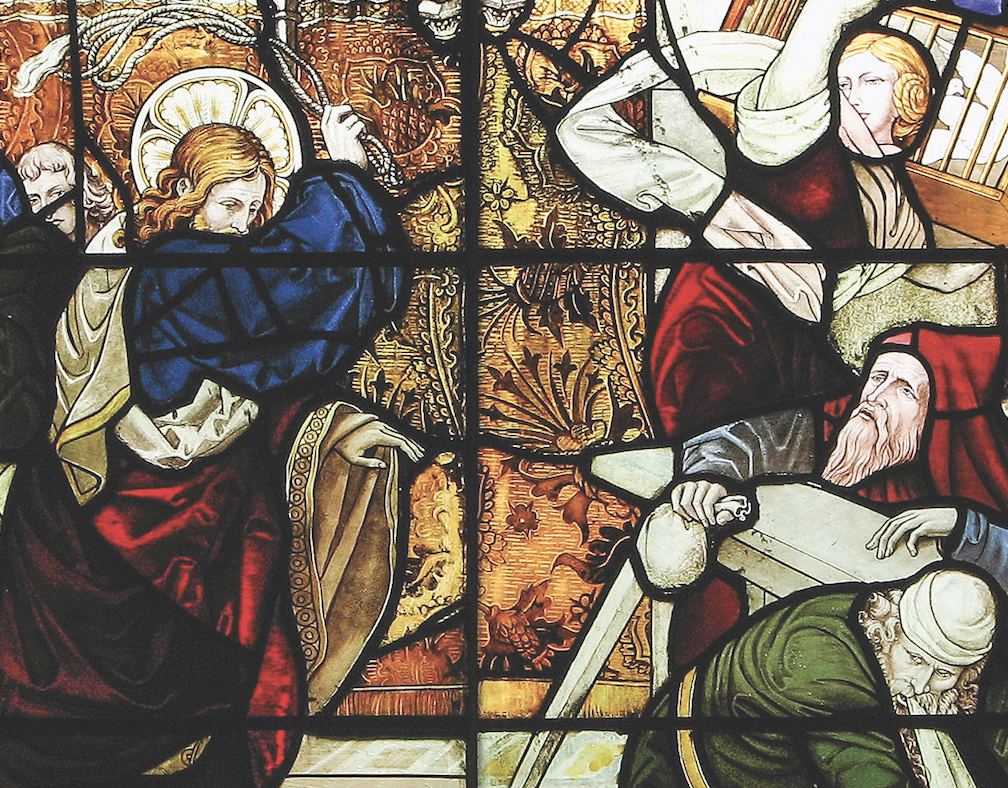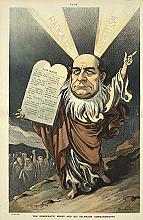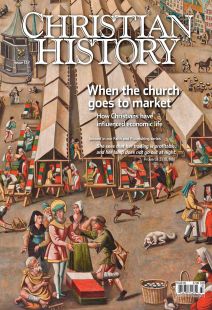God’s kingdom

[Johann Thorn Prikker, detail from Casting out the Moneychangers from the Temple, c. 1912, stained glass—Germanisches Nationalmuseum, Nuremberg, Germany—Daderot / [Public domain] Wikimedia]
How can Christians and the market best relate to each other today? Christian History spoke to two researchers who are concerned with these questions. Denise Daniels is Hudson T. Harrison Professor of Entrepreneurship at Wheaton College (following over two decades as a professor of management at Seattle Pacific University) and coauthor of Working in the Presence of God (2019).
Christian History: How have you explored the relationship between faith and work in your own calling?
Denise Daniels: As a professor I teach people how to use their work to serve God and to understand the breadth of work that can contribute to God’s kingdom on earth. In my years at SPU, I helped students identify their personal vocations and develop a global vision for what business can be. I’ve also conducted research to identify what people of faith are doing to live their faith out in their work. Finally, I’ve helped create the film series Faith & Co. (www.faithand.co), which profiles people intentional about living out their faith in business, trying to portray that in a beautiful and winsome way on both the individual and systemic level.
CH: What do you say to people who ask if business is legitimate?
DD: I ask: “Why do you ask that? Is it because you don’t like capitalism? Or do you think that people who work in business are sullied because they are not doing church work?” Depending on the concern, I have a different response. I think a marketplace career is one of the best ways to serve God because business as an institution is so impactful in the world, and we need Christians in it serving God. The last thing we need is Christians abdicating that responsibility.
We did a summer seminar with business and economics faculty at SPU and asked: What is unique about business? What makes it something that contributes to human flourishing? Business certainly has flaws. But everything has flaws—we live in a fallen world. What if we think about business as an institution that God has ordained, and we look at it from this perspective? What does God want business to accomplish in the world?
We agreed as a faculty on two things. 1) Business is designed to provide goods and services that contribute to human flourishing. It is productive. The Genesis mandate to be fruitful and multiply has implications for lots of domains and lots of institutions, not just procreation in the context of family. Successful business takes raw materials combined with creativity and ingenuity, and grows them into something new. 2) Business provides employment: opportunities for people to live out their vocation. Work is embedded in creation, it reflects the character of God, reflects God’s nature. One of the primary places people work is in business. I still really think those are constitutive of God’s kingdom.
Brent Waters is Jerre and Mary Joy Stead Professor of Christian Social Ethics at Garrett-Evangelical Theological Seminary and author of Just Capitalism: A Christian Ethic of Economic Globalization (2016) as well as other books on Christian ethics.
CH: How did you come to write Just Capitalism?
BRENT WATERS: I tried to take seriously Catholic social teaching on the “preferential option for the poor.” The only poverty alleviation approach that seems to work is to enable the poor to participate in the market. How can we best do that? We need to enable them to be educated and acquire skills. Also, I married into a business family. Much of the rhetoric I heard from colleagues in higher education didn’t match what I saw in business people—some scoundrels, but many good people who were concerned about people, not just in it for the money.
CH: What do you say to people who ask if business is legitimate?
BW: I had a colleague who also held an endowed chair—he asked me if I thought making a profit was immoral. I said that if he believed that, he needed to resign his chair, funded as it was by the labor of a businessperson. No doubt about it, if you look at most of the teachings of Scripture, most are not favorably disposed toward commerce. What has to be taken into account is that for the first 19 centuries of Christianity, that made sense, because it was an agrarian economy; zero-sum, only so much you can take out of the ground. With the Industrial Revolution, we moved to an economy of growth. We have to rethink what it means to be in this kind of economy and what that means about our neighbor.
CH: What kind of reaction have you gotten from the book?
BW: Friends on the left thought I’d sold out to the evil empire; friends on the right thought I didn’t go far enough in getting government out of the market. I believe that tending to the physical well-being of people is central, not peripheral to the gospel. The Incarnation means God took our physical and material life very seriously. I think it’s cruel to keep people dependent—we have to free them.
CH: Any examples of where you see this working well?
BW: Not right now with COVID and the lockdown economy. Before that, yes. Ironically, one of the best examples for this is Sweden—their entire education system is funded through vouchers, which brings competition between state and private schools.
Education isn’t just job skills. But it’s a crime in the United States that you can come out of high school and not be prepared to do much. We need internships, particularly for those who are not college bound. We are facing a huge shortage of skilled labor. Without electricians, plumbers, etc., society comes to a screeching halt. We should be investing in this and restoring the dignity of that kind of work. For people like me, who during the pandemic could stay at home and work, what had been invisible to me is the vast majority of people who can’t. It’s brought home to us how much we depend upon that ordinary, mundane, and highly skilled work. CH
By Denise Daniels, Brent Waters, and the editor
[Christian History originally published this article in Christian History Issue #137 in 2020]
Denise Daniels is Hudson T. Harrison Professor of Entrepreneurship at Wheaton College; Brent Waters is Jerre and Mary Joy Stead Professor of Christian Social Ethics at Garrett-Evangelical Theological SeminaryNext articles
Money Matters: Recommended resources CH 137
Find more on the history of the church’s relationship with economics and the market in these resources selected by CH’s authors and editors.
The editors and issue authorsBible in America: Did you know?
Bible towns, Bible songs, Bible novels, and pocket Bibles
the editorsBible in America: Letters to the editor
Readers respond to Christian History
our readers and editorsBible in America: Editor's Note
Life was saturated with references to God and to scriptural metaphors.
Jennifer Woodruff TaitSupport us
Christian History Institute (CHI) is a non-profit Pennsylvania corporation founded in 1982. Your donations support the continuation of this ministry
Donate





